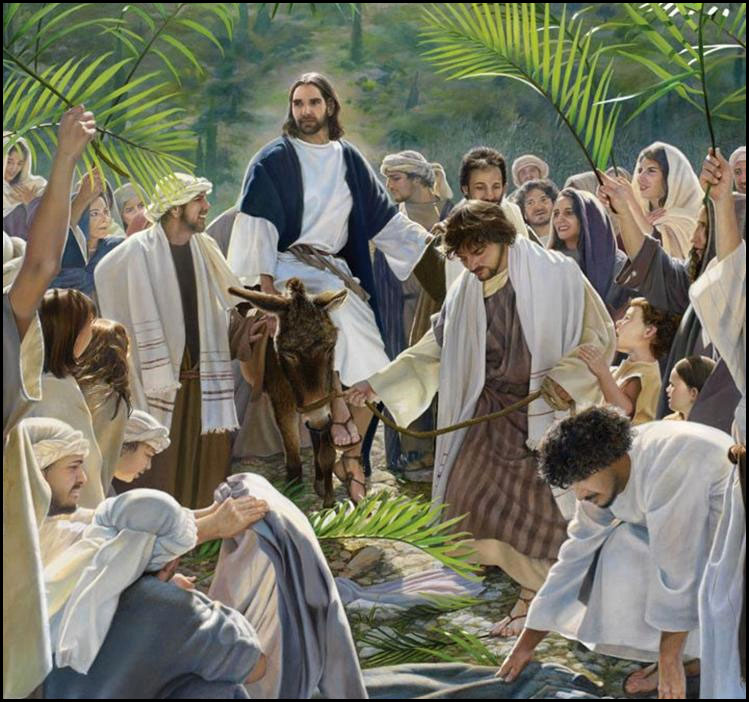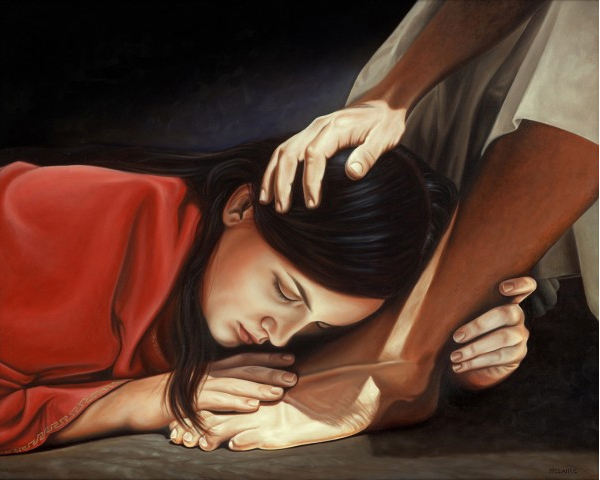Cell June 26 - Love, Schmove
Tuesday, June 30, 2009
At our Friday night cell meetings, our 10-12 year-old group has been going through the Gospel of John, as part of a challenge I gave them several months ago. Last week, we talked about Jesus' entry into Jerusalem. This week, started looking at some of His last teachings before His death on the Cross.
Chapters 13-16 in John narrate Jesus' last words of teaching to his disciples. There is an almost hurried tone to these words. It's as if the Lord is giving a last-minute pep talk. I'm reminded of a scene from the movie Any Given Sunday. Coach D'Amato is walking down the tunnel onto the field with his young, inexperienced quarterback, Willie Beaman. D'Amato just keeps firing advice and instructions at Willie, who just keeps replying "Yeah." For the disciples, like Willie, it was a lot of information to absorb in very little time.
Chapters 13-16 in John narrate Jesus' last words of teaching to his disciples. There is an almost hurried tone to these words. It's as if the Lord is giving a last-minute pep talk. I'm reminded of a scene from the movie Any Given Sunday. Coach D'Amato is walking down the tunnel onto the field with his young, inexperienced quarterback, Willie Beaman. D'Amato just keeps firing advice and instructions at Willie, who just keeps replying "Yeah." For the disciples, like Willie, it was a lot of information to absorb in very little time.
One of the first things that Jesus told the disciples was that He was giving them a new commandment. This must have been confusing to them. First, He reduces the Ten Commandments down to two. Now, He's giving them a new one. And like the other two (Love God above all, love your neighbor as yourself), His new commandment is born of love: "...as I have loved you, that you also love one another." (John 13:34, NKJV)
This opened the discussion on what "love" really means in the New Testament, especially when Jesus is speaking of it. John's Greek translation of Jesus' instructions uses the word agapeo ( αγαπη ) for "love." This is one of two words used in the NT for "love," the other being phileo. ( φιλεϖ )
Without getting too technical, there is a very important difference. Phileo is used to reference an emotional, heart-centered love. Phileo love is an easy love, an immediate love. Not that there cannot be intensity to it, but it is love that does not generally have a cost to it.
Agapeo, or agape love is much different. Beyond a simple feeling of the heart, agapeo requires an act of the will. It is a love of the mind, a sacrificial love, a love that requires risk. This is a love that places the one loved above self.
This is the kind of love that Jesus calls us all to. Not an easy, painless, "like" kind of love; He desires us to love one another with a risky, sometimes painful, willful love. It's easy to love someone when they are nice to you. But loving someone who just smacked you in the face - that's agapeo.
Reminder!!! Due to the Fourth of July Weekend, there will be no cell group on July 3rd!!
Posted byMichael J Mahoney at 5:30 AM 0 comments
Labels: John, love, relationships
GLCCKidz Celebrates Father's Day!!
Tuesday, June 23, 2009
This week was Father's Day in the U.S., and our children's cells get in on the act. This week, Sister Anita's 4-9 year old cell group was highlighted at our Sunday service. They made a special presentation for all the father's in attendance, giving them a gift of The Bible Promise Book. The pastors also received special Father's Day cards.
The kids then led the congregation in some worship, singing the Desparation Band's "Counting on God.
Posted byMichael J Mahoney at 7:16 AM 0 comments
Labels: children, Events, family, relationships
Cell June 19 - Almost Time
This weeks lesson in our series on John takes us right to the gates of Jerusalem - and right to the beginning of the Passion, or events and suffering of Christ leading up to the Crucifixion.
John 12 tells us about Jesus's entry into Jerusalem. Historically, we know why: Jesus was coming to Jerusalem to celebrate the Passover. Custom required that all Jewish families travel to Jerusalem to celebrate this solemn festival. He rode into Jerusalem on a donkey, which (according to tradition) is the way the Messiah would enter Jerusalem.

Here begins the events that lead up to Jesus' death on the Cross. The Triumphal Entry takes place on what we celebrate as Palm Sunday. The countdown of Holy Week then begins.
The next few weeks will focus on the Passion, and the events surrounding Holy Week.
Posted byMichael J Mahoney at 7:01 AM 0 comments
Cell June 12 - What a Waste!
Monday, June 15, 2009
This week continues our look at the Gospel of John. Last week, we looked at the story of Lazarus, Jesus' last and greatest miracle before the Resurrection. John continues to tell us the story of the family of Lazarus, and his sisters, Mary and Martha.
Mary - who has shown her devotion to the Lord before - instead of helping Martha with the meal, takes a large flask of expensive oil, and annoints Jesus, wiping His feet with her long hair. While history might debate the identity of this woman, one thing is clear: she uses a tremendously expensive amount of oil on this gesture. Judas states that the oil was worth 300 denarii, or a man's wages for a year.
There are a couple of things to take away. One is that Judas didn't really care about the poor, as he states in the text. Judas was the groups treasurer, and John reports that he was skimming from the cashbox. He wanted more money to cover his stealing.
Also, this is a very symbolic moment, as this annointing was usually done for the dead. This is a foreshadowing of what is going to happen to Jesus.
More important, though, is what Jesus says in verse 8: "For the poor you have with you always, but Me you do not have always.”
He was telling us to spend time with God before it's too late. While God is always present, our days are numbered. Tomorrow is never promised, so don't delay in spending time with Jesus.
Posted byMichael J Mahoney at 12:17 PM 0 comments
Labels: anointing, death, John, Lazarus, relationships
Cell June 5 - Death is Smelly
Monday, June 8, 2009
Summertime is fast approaching. Things move along so quickly, it's hard to keep up sometimes. Last week was Fifth Friday, and though we usually do something fun, this time we just let everyone enjoy the weekend.
This week was an interesting topic. As we continue our journey through the Gospel of John, we come upon the story of Lazarus. Now, many people know the story of old Lazarus, and how he rose from the grave at Jesus' command. But have they really looked at it.
Lazarus of Bethany (as opposed to Lazarus the beggar) was, of course, a good friend of Jesus. Lazarus and his sisters, Mary and Martha, can be found in the Gospels as the people that Jesus often visits when he comes to Jerusalem. The story of Lazarus is (aside from the Passion) John's longest single story. The miracle of Lazarus is the reason people lined up to see Jesus when He entered Jerusalem, and could have been the final straw that caused the Sanhedrin to seek His death.
It is reported to Jesus that his friend Lazarus is ill. Jesus did not go right to Bethany, but waited. When He finally got to Bethany, He was told Lazarus had been dead for four days. Then He said something to the effect of "I'm glad I wasn't here,l because now you can believe." He then gives his famous quote in John 11:25-26:
I am the resurrection and the life. He who believes in Me, though he may die, he shall live. And whoever lives and believes in Me shall never die. Do you believe this?”
John 11 also contains verse 35, which (in the KJV and NKJV) simply says:
Jesus wept.
What a tender moment! Here is the Savior of the World, sharing in His full humanity by shedding tears for his fallen friend. Or perhaps, for all of us?
A memorable part of the story is when Jesus orders the stone to be rolled away, and Martha (always the practical one) says that Lazarus must really stink by now. After all, he's been dead in the hot desert for four days. But Jesus us undeterred, and calls Lazarus forward.
Of course, this demonstrates Jesus' authority over death, an authority He would soon be using to raise himself from the grave.
Posted byMichael J Mahoney at 7:34 AM 0 comments
Subscribe to:
Posts (Atom)




